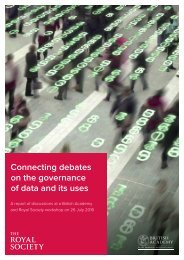BIG DATA
VodafoneInstitute-Survey-BigData-Highlights-en
VodafoneInstitute-Survey-BigData-Highlights-en
Create successful ePaper yourself
Turn your PDF publications into a flip-book with our unique Google optimized e-Paper software.
<strong>BIG</strong> <strong>DATA</strong> – opportunities AND RISKS<br />
Trust<br />
There are several ways to gain and increase trust between<br />
people (consumers/citizens) and organisations with regard<br />
to the collection and usage of personal data. Users need to<br />
have a clear understanding of what kind of data is collected<br />
about them and what will be done with it. The use of<br />
simple and clear language and short terms and conditions<br />
greatly help in gaining trust; over two thirds of the respondents<br />
agreed with this statement (68 percent). Furthermore,<br />
transparency about what data is collected and how it could<br />
be used is the second most important driver to gain trust<br />
– this is mentioned by 64 percent of the respondents.<br />
Organisations can adress these needs by avoiding small<br />
print: 56% say that would increase trust.<br />
How should an institution gain your trust<br />
with regard to the use of your personal data?<br />
Percentage shown = “yes”<br />
Use simple, clear language and<br />
short terms and conditions<br />
which I can understand<br />
Be transparent about what data<br />
is collected and how it could<br />
be used<br />
Avoid small print<br />
Ø 68%<br />
Ø 64%<br />
Ø 56%<br />
CZECH CZECH REPUBLIC REPUBLIC<br />
77<br />
CZECH CZECH REPUBLIC REPUBLIC<br />
68<br />
CZECH CZECH REPUBLIC REPUBLIC<br />
74<br />
GERMANY GERMANY<br />
76<br />
GERMANY GERMANY<br />
57<br />
GERMANY GERMANY<br />
67<br />
SPAIN SPAIN<br />
74<br />
SPAIN SPAIN<br />
77<br />
SPAIN SPAIN<br />
71<br />
FRANCE FRANCE<br />
51<br />
FRANCE FRANCE<br />
65<br />
FRANCE FRANCE<br />
53<br />
IRELAND IRELAND<br />
57<br />
IRELAND IRELAND<br />
39<br />
IRELAND IRELAND<br />
28<br />
ITALY ITALY<br />
79<br />
ITALY ITALY<br />
76<br />
ITALY ITALY<br />
64<br />
NETHERLANDS<br />
61<br />
NETHERLANDS<br />
73<br />
NETHERLANDS<br />
44<br />
UNITED UNITED KINGDOM KINGDOM<br />
68<br />
UNITED UNITED KINGDOM KINGDOM<br />
55<br />
UNITED UNITED KINGDOM KINGDOM<br />
50<br />
Ohne obenTitel 1<br />
Ohne obenTitel 1<br />
Ohne obenTitel 1<br />
0<br />
0<br />
25<br />
25<br />
50<br />
50<br />
75<br />
75<br />
100<br />
100<br />
0<br />
0<br />
25<br />
25<br />
50<br />
50<br />
75<br />
75<br />
100<br />
100<br />
0<br />
0<br />
25<br />
25<br />
50<br />
50<br />
75<br />
75<br />
100<br />
100<br />
Another way of gaining trust is through the empowerment<br />
of users. Over half of the respondents (51 percent) associate<br />
trust in institutions with the potential for having personal<br />
influence over their personal privacy settings. Another<br />
form of empowerment is the encouragement of public<br />
feedback from users, which is mentioned by four out of<br />
ten people. In particular the older generation (60+) and<br />
people with a lower educational level show less interest in<br />
individual privacy settings. Being a well-known brand is<br />
not enough to create trust, with only a third (34 percent)<br />
agreeing with this statement.<br />
14






